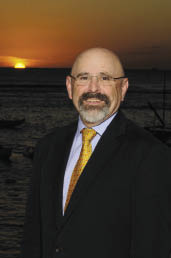Campus News
Alumni Regent Kenneth Feingold to bring ‘Slug perspective’ to board
Editor’s note: In December, Los Angeles attorney Kenneth A. Feingold (Cowell ‘71, history) was named an alumni Regent. He is the fourth UCSC alumnus to represent the campus on the UC Board of Regents. Two voting Regent positions rotate among the system’s 10 campuses. UC’s alumni Regents are selected for two-year terms. UCSC last selected the alumni […]

Editor’s note: In December, Los Angeles attorney Kenneth A. Feingold (Cowell ‘71, history) was named an alumni Regent. He is the fourth UCSC alumnus to represent the campus on the UC Board of Regents. Two voting Regent positions rotate among the system’s 10 campuses. UC’s alumni Regents are selected for two-year terms. UCSC last selected the alumni Regent seven years ago.
Here, Feingold describes his goals for the position, as well as the challenges he expects.
As an alumni Regent, I will represent the entire UC system, not just my alma mater—but I will clearly bring a “Slug perspective” to the board. At UCSC, the vital importance of undergraduate education is in our DNA—but we’re also a great example of a successful, cutting-edge research institution and a place where community service is valued highly.
Our values are essential to the UCSC experience, and are also the core values of the UC system as a whole.
And therein lies the challenge. The Regents are charged with adopting policies and practices that promote access, research, teaching, and learning while operating within budget constraints. Everyone understands that the university faces a daunting budget situation, and the California legislature has been unwilling to provide adequate funding. The continuing spikes in tuition and housing costs pose a real, substantial burden to our students and their families.
As a UCSC alumnus, I want to promote policies that will ensure that qualified students, regardless of means, have access to an affordable, quality education; that promote diversity in admissions; and that provide sufficient faculty and resources to achieve first-rate research, teaching, and learning.
My immigrant grandmother never attended college, but she sent me $25 every month I was at UCSC to support my college education. I was fortunate that tuition was affordable in 1967. Every student who attends UC should be able to plan ahead without the rapid tuition increases we’ve experienced in recent years.
As an alumni Regent, I will promote a pathway for undergraduate students to graduate in four years, to increase retention and graduation rates for undergraduate and graduate students, and to foster and reward excellence in teaching and research.
As the cost of an education increases for students, so too must the university be vigilant in increasing programs and policies that serve students and foster excellence in faculty research and teaching.